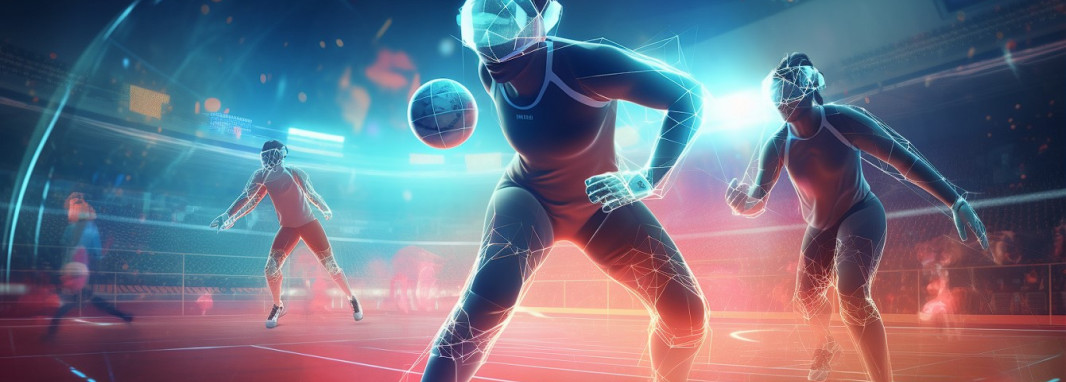In the landscape of modern technology, AI has emerged as a strong transformative force, not just in traditional tech-centric domains but across various sectors.
Its reach and influence have extended to realms once thought untouchable by the hands of automation and intelligent algorithms. Among these, the world of sports stands out as a particularly striking example of AI's revolutionary impact.
The sports industry, known for its dynamic nature and reliance on human skill and spontaneity, is now at the forefront of an AI-driven transformation.
From enhancing athlete performance to reshaping fan engagement, AI's role in sports is multifaceted and profoundly influential.
According to one of the reports, the market is forecasted to skyrocket to a staggering 19.2 billion dollars by 2030.
As we delve into this exploration of AI in sports, we embark on an informative journey to uncover how intelligent algorithms are redefining strategies, training, performance, and even the very nature of sporting competitions.
From predictive analytics enhancing player performance to virtual reality revolutionizing fan experiences, AI is setting the stage for a new chapter in the sports saga that promises to be as exciting as it is transformative.
AI in Enhancing Athletic Performance and Training
Integrating artificial intelligence into sports has revolutionized how athletes train and perform. At the heart of this transformation is the application of AI and predictive modeling, technologies that have redefined the boundaries of athletic capability and safety.
Predictive Modeling in Player Performance and Injury Prevention

AI's role in predictive modeling is a game-changer for athlete performance analysis and injury prevention.
Sophisticated AI algorithms can now sift through vast amounts of data - including player stats, injury history, and disciplinary records - to foresee potential risks and performance trajectories.
These predictive models are invaluable tools for coaches and sports strategists, enabling them to tailor training and game plans to mitigate injuries and optimize player performance.
The result is a more proactive approach to managing athletes, where decisions are data-driven and strategically sound.
Smart Wearables and Real-Time Tracking Technologies
Complementing predictive models encompasses a range of devices like AI fitness trackers and smartwatches, which collect critical data on player movements, biomechanics, and physical strain.
This real-time data offers continuous insights into an athlete's condition, enabling immediate adjustments to training regimens and strategies to prevent overexertion and injuries.
Application in Major Sports Leagues
In basketball, the National Basketball Association (NBA) employs AI-driven tools for scouting and performance analysis, allowing for a more nuanced understanding of player abilities and game dynamics.
The National Football League (NFL) harnesses AI to analyze game films and enhance player tactics and physical readiness.
AI-Driven Innovations in Sports Equipment and Techniques
The impact of artificial intelligence extends beyond player performance and training methodologies, venturing into the realm of sports equipment and techniques.
Development of AI-Powered Sports Equipment
The advent of an AI-powered soccer ball demonstrates a leap in technological integration within traditional sports gear.
This soccer ball, equipped with sensors and AI algorithms, can provide real-time data on its trajectory, spin, and force, offering players and coaches unprecedented insights into every kick and pass.
Similarly, advancements in tennis equipment, particularly AI-enhanced tennis rackets, mark a significant innovation.
These rackets are designed to analyze a player's swing, contact point, and ball spin, offering personalized feedback to improve technique and power.
This technology enables players to make real-time adjustments to their play, enhancing the training process and match performance.
Impact on Athlete Performance and Training Efficiency
Incorporating AI into sports equipment has profound implications for athlete performance and training efficiency.
With AI-enabled gear, athletes gain a more profound, data-driven understanding of their interactions with the equipment, allowing them to fine-tune their techniques based on precise feedback.
This level of analysis was previously unattainable with traditional equipment.
For coaches and trainers, AI-powered equipment provides a wealth of information that can be used to develop more effective training programs. They can now identify specific areas of improvement for each athlete, tailor training to target these areas and monitor progress in real-time.
Furthermore, AI-driven innovations in equipment are democratizing high-level training technology, making it accessible to a broader range of athletes, from professionals to amateurs. This accessibility is pivotal in elevating the overall sports training and performance standard.
In conclusion, AI-driven innovations in sports equipment and techniques represent a significant leap forward in the sporting world.
By marrying technology with traditional sports gear, these advancements enhance how athletes train and perform and reshape the future landscape of sports.
AI's Impact on Fan Experience and Engagement
As the sports industry embraces the digital age, artificial intelligence will profoundly transform the fan experience.
Integrating AI-driven Virtual Reality (VR)/Augmented Reality (AR), chatbots, and personalized content enhances fan engagement and redefines how fans interact with their favorite sports and teams.
The Future of Fan Experiences with AI-Driven VR/AR and Chatbots
The future of sports fandom is poised to become more immersive and interactive thanks to AI-driven VR and AR technologies.
Imagine donning a VR headset to be virtually seated courtside at an NBA game or standing beside your favorite basketball player on the field.
These technologies promise to bridge the gap between fans and the live-action, irrespective of their physical location.
Fans could, for instance, experience a 360-degree view of the game, access different camera angles, and even receive player-specific data and insights in real time.
Chatbots, powered by AI, are another frontier in enhancing fan engagement. These sophisticated bots can provide instant updates, player statistics, and even personalized recommendations based on a fan's preferences and previous interactions.
With this level of personalized communication, building a more robust and engaged fan community is much easier.
Examples of AI in Enhancing Fan Engagement

The FIFA+ app, introduced during the FIFA World Cup 2022, is a prime example of AI's role in fan engagement.
This app utilized AI to offer fans a unique and interactive experience. By pointing their smartphones towards the pitch, fans could access player-specific information, live statistics, and heat maps.
Such features enriched the viewing experience and allowed fans to engage on a deeper level.
Another example is the use of AI to generate personalized content for fans.
IBM's Watson, used in conjunction with Wimbledon, is a case in point. Watson's AI capabilities enabled the rapid generation of match highlights, curated based on elements like player reactions and crowd cheers.
This approach ensured that fans received engaging and relevant content, enhancing their overall experience.
In conclusion, AI is set to revolutionize fan experiences in sports.
By leveraging VR/AR, chatbots, and personalized content, AI opens new avenues for fans to connect with and enjoy their favorite sports.
As AI technology continues to evolve, it will definitely play an enourmous role in the future of sports fandom, making it more immersive, interactive, and personalized than ever before.
Ethical and Practical Challenges of AI in Sports
As the sports industry increasingly adopts artificial intelligence technologies, it is imperative to acknowledge and address the ethical and practical challenges accompanying its implementation.
Educating stakeholders about these challenges is crucial for the responsible and fair use of AI in sports.
Data Privacy and Bias in AI
Data privacy is one of the primary ethical concerns in using AI in sports. AI systems in sports often require collecting and analyzing vast amounts of personal data from athletes, including health and performance metrics. Ensuring the security of this sensitive data against breaches and unauthorized access is paramount. There is also the issue of consent - athletes must be fully informed and agree to the extent of data collection and usage.
Balanced AI Governance and Regulations in Sports
Addressing these ethical challenges requires a balanced approach to AI governance and regulations in sports.
This involves establishing clear guidelines and standards for data collection, usage, and privacy.
There should be transparency in how AI systems operate and make decisions, significantly when these decisions impact athlete selection, performance evaluation, and injury management.
Furthermore, there is a need for diverse and inclusive data sets to train AI systems, reducing the risk of inherent biases.
Regular audits and assessments of AI systems for bias and ethical compliance are essential to maintain fairness and integrity in sports.
Regulatory bodies in sports should collaborate with technology experts to understand the nuances of AI and implement regulations that safeguard the interests of all stakeholders - athletes, teams, fans, and the sports community at large.
These regulations should be flexible enough to adapt to the rapidly evolving AI landscape but robust sufficient to ensure ethical compliance and protect against misuse.
In conclusion, while AI presents significant opportunities for advancement in sports, it is accompanied by ethical and practical challenges that must be carefully navigated. Educating stakeholders about these challenges and implementing balanced governance and regulations are crucial steps toward the responsible and equitable use of AI in sports.
Advancements in AR/VR and Predictive Analytics
Integrating AR and VR in sports is expected to reach new heights, creating immersive experiences beyond the current boundaries.
Imagine a world where fans can experience games from the athlete's perspective, feeling the rush of the stadium or the intensity of a match from their living rooms.
According to insights from a content team and Forbes, the potential of AR/VR in sports is vast, ranging from enhanced training simulations for athletes to interactive game-day experiences for fans.
These technologies could enable fans to analyze plays in real time, view games from various angles, or even experience simulations of historical sporting events.
On the other hand, predictive analytics is set to become more sophisticated, offering more profound insights into player performance, game strategies, and injury prevention.
This could mean predicting a player's career trajectory with greater accuracy or understanding the dynamics of team performance under various conditions.
Wrapping Up
We delved into how AI and predictive modeling revolutionize athlete training and performance, enabling a more data-driven, precise, and safe approach to sports.
The development of AI-powered sports equipment, like smart soccer balls and tennis rackets, exemplifies the fusion of technology with traditional sports gear, enhancing athlete performance and training efficiency.
In fan engagement, AI-driven VR/AR, chatbots, and personalized content are redefining the fan experience, offering immersive and interactive ways for fans to connect with their favorite sports.
Ethical considerations, such as data privacy and bias, along with the need for balanced AI governance and regulations, are crucial areas that need careful navigation to ensure AI's equitable and responsible use in sports.
Looking ahead, the future of AI in sports is rife with possibilities.
The journey of AI in sports is just beginning, and its potential to further evolve the industry is boundless.
AI development in sports encompasses various dimensions, including enhancing athlete performance, AI for fitness, improving fan engagement, refining training methodologies, and optimizing injury prevention and recovery strategies.
As technology continues to advance, AI will likely become more integrated into every facet of sports, offering insights and innovations that were previously unimaginable.
 economy and refugees by hiring Ukrainian Software Developers - we donate a lot to charities and volunteer foundations
economy and refugees by hiring Ukrainian Software Developers - we donate a lot to charities and volunteer foundations






